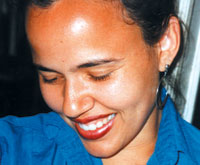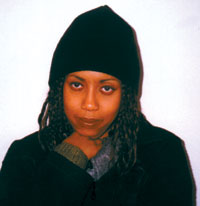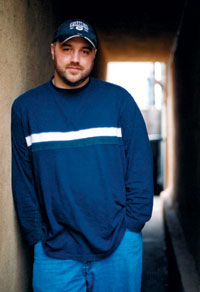25 NEW FACES OF INDEPENDENT FILM 2002
11 Divya Srinivasan
MAJORING IN HISTORY at the University of Texas at Austin, Divya Srinivasan was not an obvious candidate to become an animator. Not until she created a comic strip, Sexually Repressed Girl, for her college paper, did she pursue more artistic endeavors. Upon graduation, she left for San Francisco to work as an illustrator and animator for a Web design firm before becoming a freelancer.
Five years later, she returned to Austin and, through a twist of fate, immediately landed a job on Richard Linklater’s Waking Life. On a flight from San Francisco, her sister sat beside an animator who was working on the project. As Srinivasan explains, "They got to talking and it looked like they were still looking for animators. My sister told me about the job. The timing was perfect and I began working on the film the week after I arrived in Austin."
She then approached the band Spoon about directing a music video for their song "Everything Hits at Once," and they agreed. Retaining the hallucinatory quality of Austin artist Bob Sabiston’s animation software and aided by a haunting soundtrack, the video follows a young man wandering through town as he encounters several women, resulting in a series of missed opportunities. Moving like a melancholic dream, Srinivasan imbues the video with a sense of loss and aimlessness as reflected through her blank-faced protagonist.
While she admits some predilection for depicting people getting "screwed over," she eschews all labels as a purveyor of "sad sacks." Her interest, rather, lies in characters and their stories. A storyteller at heart, Srinivasan allows viewers to bring their personal slants to her tabula-rasa creations.
Her most recent work, Record Playing Party, is a series of still photographs from an Austin house party. Shown in quick succession, it moves like an animated flipbook equipped with a rock soundtrack. Currently, Divya is adding to her Web site, and future projects include two more shorts, one possibly in live action.– Evelyn So
Contact: www.pupae.com
 |
JOSSLYN LUCKETT isn’t a musician but her latest screenplay, Didn’t Know What Time It Was, has the rhythm of a classic jazz riff. "I enjoy the music of words," she says. "I’m a frustrated musician." The screenplay portrays a stifled jazz bassist who reunites with his estranged mother years after his father’s death. Luckett’s ear for nuance lifts the script outside the natural boundaries of the jazz movie. Through her use of lyricism, jazz music becomes a vehicle for emotional uplift instead of a stereotypical metaphor of an artist’s self-destruction. Don’t be fooled – the music Josslyn weaved into her script will keep your foot tapping.
At 32, Josslyn has not limited her awareness of the American cultural milieu to the screen. After earning an MFA in dramatic writing from NYU, her plays, such as Chronicles of a Comic Mulatta: An Oreo/Choreopoem, have been performed at The New York Public Theater, The National Black Theater Festival and The Walnut Street Theater in Philadelphia, to name a few. In the mid-’90s, Josslyn enlivened the sitcom circuit as a writer for the WB’s Steve Harvey Show through the Writer’s Guild Trainee Program. She was the only woman on the eight-person writing team. "It was a challenge," she says. "But having eight writers at a time mark-up my work helped me become less precious about my writing.""
Luckett knew she was making it as a screenwriter when she was commissioned to write Love Song for MTV Films, later directed by Julie Dash. As she watched the crew amassing on the Canadian set, she was thrilled. "It was amazing to realize they were all working on something I had written."
Luckett has participated in the Sundance Institute’s Playwright’s and Screenwriting labs. As is appropriate for someone with Luckett’s whipsmart, she is looking to move into a directorial role.
She recently brought Didn’t Know What Time It Was to the IFP/West 2002 Director’s Lab and has sent out the script to a jazz composer who is interested in scoring the project. Luckett also has a few ideas for short films to hone her skills and build on what she learned at the IFP lab. As for Didn’t Know What Time It Was, she is looking for collaborators to turn her script into a workable project. – Anikah McLaren
Contact: josslyn@earthlink.net
 |
FILMMAKER Lisa Collins likes to keep her options open. Having graduated from Yale, where she studied photography and American Studies, she decided she would either go on to be a Fulbright scholar or to film school. Her impetus for going to film school was to both make films and form a showcase for characters she was creating as an actress.
In 1994, her first short film, Miss Ruby’s House reflected five different racially diverse characters, all played by Collins, each struggling with the same tragedy – the death of the babysitter who helped raise them.
Her thesis film, Tree Shade, told three stories, all about African-American women at different moments of American history confined by historical contingencies and also told in different historical styles of African-American cinema (from the emotive hand-wringing of Oscar Micheaux to the bubbling booty shaking of ’70s Blaxploitation). While theoretically adept, the film came from a very autobiographical place. Collins explains, "My dad was from Cuba and my mom from Jamaica. They told me, when they came here, ‘if you wanted to live here, you have to be a maid. If you are coming in as a black immigrant, that is what you have to do.’ And I remember when my dad would pick me up on the Upper West Side and see all the black nannies, he would go on about how things have changed, and how they have stayed the same."
Her new project, The Grass is Greener – which she took to the 2001 Sundance filmmaking labs – continues her exploration of race and identity in her own off-kilter sensibility. It features three daughters of an aging B-movie actress who exist as white during the day and black at night – that is, until the spell is broken and they must unanimously choose a race. – Peter Bowen
Contact: lcollinsnyc@yahoo.com
 |
CRAIG BREWER’S first feature, The Poor and Hungry, appears emblematic of what is called regional filmmaking – that region being the South, and Memphis in particular. The no-budget black-and-white digital drama captures the lives of a street hustler, a car thief and a lonely cello player whose car he has stolen, and Brewer cast local non-professionals and used the actual bars, strip joints, hack shops and recital rooms of Memphis as locations. Brewer, however, did not actually grow up in Memphis. His parents left Memphis – a place "best seen in the rearview mirror," they would say – for the San Francisco Bay Area when Brewer was about five. There he grew up aspiring to a career in theater, producing a number of plays and attending San Francisco’s prestigious American Conservatory Theater.
In 1993, Brewer moved back to Memphis to reclaim his southern roots. For him, there was a "there" there. He made several attempts at filmmaking, including shooting one film that remains to this day in cans in his back room. After his father’s death, though, Brewer took one third of his $30,000 inheritance to live off for a year and half and used the other $20,000 to finance his film. Going extremely low-end, Brewer bought two floor-model digital-8 video cameras from Circuit City, and a Sennheiser microphone with boom pole, and was off and running. His only other big investment was a computer and a copy of Adobe Premiere for editing.
Brewer’s real savings, though, came in the form of talent and locations. For Brewer, "The city and the people were unbelievable. The massage parlor and strip club were all real. And the production spirit was infectious – we had strippers hanging out for 10 hours just to see what they could do to help out." Even the film’s biblical-sounding title is less a comment on its characters, than the name of the local bar where they all hang out. This very local, low-budget feature connected with more than the folks of Memphis. After touring at a range of festivals, then premiering on the Independent Film Channel, the film brought Brewer to Focus Films, which is currently developing his next film, Hustle & Flow. – Peter Bowen
Contact: Sanford Gross, (310) 208-2100
15 Przemyslaw Reut
"SOMETHING intrigued me… I can’t really explain it. Something waiting to be discovered," says Przemyslaw Reut about a visit to an upstate New York facility for autistic children he made in 1997 while researching a script he would eventually abandon. That "something" led quickly to him becoming a full-time counselor in a special-needs unit at the summer camp run by that facility. Upon returning to Manhattan, Reut found himself repeatedly watching video he had shot at the camp, and seeing things he was unaware of earlier. "I realized that the kids made a lot of attempts at communicating with us, but we were too blind or too busy to notice them," says Reut. The seed of a plot had firmly taken hold.
Over four years later, Reut’s resulting feature, Paradox Lake, has become a constant presence on the 2002 festival circuit. In the film, a young man escapes his sheltered and aimless life in the city by becoming a counselor at the aforementioned camp, and comes to believe a young girl there is trying to communicate with him via an intricate game. His obsessive desire to understand her leads to near-tragedy, which is, in fact, a self-rescue and redemption. Incorporating documentary, multiple shooting formats, improvisation, experimental techniques and a narrative with mythological and paranormal overtones, Paradox Lake is that rare film which, despite having a complex formal design, never loses sight of the larger human and social issues at its core.
Reut became enamored of American cinema in his native Poland, but never considered studying film because making movies was such an "elite" job. After studying journalism for two years at Warsaw University, he left for a holiday in New York and stayed. Attracted by an ad for the School of Visual Arts, he decided to give film school a try and quickly fell in love with the 16mm Bolex. His thesis film, Close Up, was the first student-made feature at SVA and played the inaugural Slamdance Film Festival and the London Film Festival in 1996. Reut credits his time interning at Good Machine and the "hard core" experience (and income) shooting music videos for groups like Wu-Tang Clan and DMX for his ability to manage two summers of shooting a mostly non-professional and autistic cast, and two years of post on Paradox Lake.
Reut is currently researching and drawing a "sort of comic book," from which he will eventually write and develop a new film project on the phenomenon of death. "What fascinates me in the movies is their potential to move people and the almost limitless options in exploring the mysteries of life. I’d love to create original, not-easily-categorized movies – something people haven’t seen before, either in their topics, narrative structure or look." – Milton Tabbot
Contact: Steven C. Beer, Esq, Rudolph & Beer, LLP., (212) 684-1001.
VOD CALENDAR


 See the VOD Calendar →
See the VOD Calendar →


